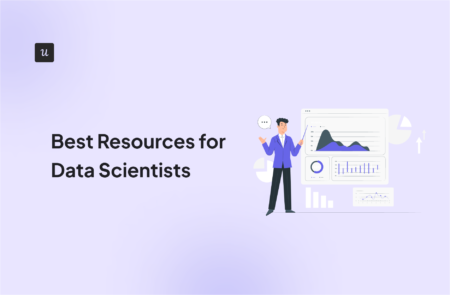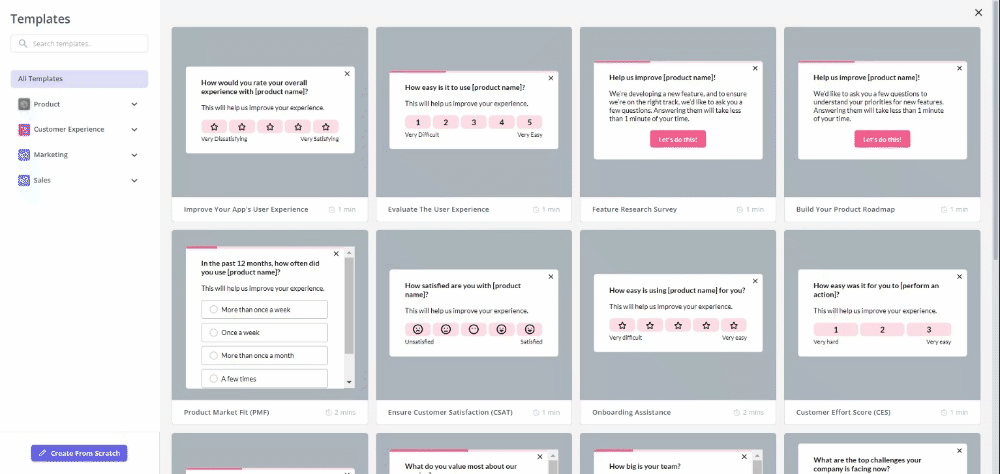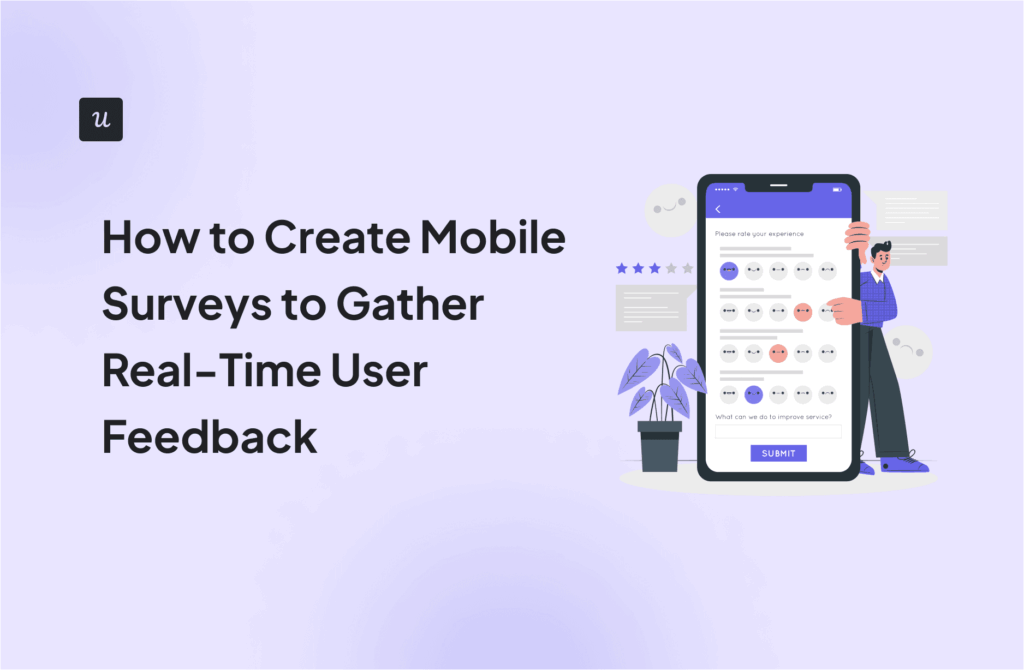
Try Userpilot Now
See Why 1,000+ Teams Choose Userpilot

Helpful resources for data scientists
Data science is a rapidly evolving field, and staying updated with the latest trends, tools, and techniques is crucial for success. In this section, we’ll explore some of the best resources for data scientists, including books, blogs, and online courses, that can help you enhance your skills and stay at the forefront of the industry.
Best books for data scientists
Data science is a vast field, so the best books for you will depend on your experience level and area of interest. Here are some highly-rated books across different categories to kickstart your data science journey:
- Python for Data Analysis by Wes McKinney: This book is a fantastic introduction to using Python for data analysis. It covers the basics of Python programming, data structures, and popular data science libraries like NumPy, Pandas, and Matplotlib.
- Hands-On Machine Learning with Scikit-Learn, Keras & TensorFlow by Aurélien Géron: This book dives deeper into machine learning algorithms and their practical implementation using popular Python libraries like scikit-learn, Keras, and TensorFlow.
- Naked Statistics: Stripping the Dread from the Data by Charles Wheelan: This book makes statistics approachable and engaging, even for those with math anxiety.
- Thinking with Data by Nathan Yau: This book goes beyond the technical aspects of data science and explores how to think critically about data, ask the right questions, and communicate findings effectively.
- Data Science for Business by Foster Provost and Tom Fawcett: This book bridges the gap between data science and business. It explains how data science can be used to solve real-world business problems and provides case studies of successful data science applications.
Best webinars for data scientists
Are you looking to level up your data science expertise but are short on time? Webinars offer a fantastic way to learn from industry leaders and gain valuable insights in a concise format. Here’s a list of highly-rated webinars:
- Data Science Salon: Offers both live and recorded webinars on a wide range of data science topics, from fundamentals to cutting-edge applications. They also have an active community forum for discussions.
- BrightTalk: Hosts webinars on various tech topics, including a dedicated section for data science with a good selection of free and paid options.
- Userpilot webinars: Covers topics relevant to SaaS user research for informed product development. It’s a great source for anyone working for a SaaS business.
- Meetup: Local groups focused on data science often host online webinars on various topics. Check for meetups in your area or browse online groups relevant to your interests.
- Major tech companies like Microsoft, Google, and Amazon frequently host webinars on data science tools and applications related to their platforms. Check their developer portals or social media for upcoming events.
Best blogs for data scientists
To empower your learning journey as a data scientist, here’s a curated list of top data science blogs:
- Data Science Central: This comprehensive resource hub covers everything in data science, from analytics and machine learning to code and career advice.
- KD Nuggets: Known for its in-depth dives into specific data science topics and algorithms, KD Nuggets is a favorite among data professionals for staying sharp on the latest trends.
- Towards Data Science (on Medium): This massive online community publishes articles from a wide range of data science professionals. You can follow it to stay updated on the latest advancements and to find diverse perspectives.
- The Mockup Blog: Authored by Thomas Mock, a data science leader at Netflix, this blog offers valuable insights into the real-world applications of data science within companies.
- DataCamp Blog: This blog caters to aspiring and beginner data scientists with clear tutorials, project ideas, and career tips.
- Userpilot Blog: While not strictly a data science blog, Userpilot offers valuable insights on user behavior analytics, a crucial skill for data scientists working on product development and customer insights.
Best podcasts for data scientists
Based on insights from online reviews and discussions, here’s our favorite list of podcasts for data scientists at different experience levels:
- Lex Fridman Podcast: This isn’t strictly data science, but Lex Fridman’s interview format delves deep into AI and its connection to data science.
- Data Skeptic: A long-running favorite, Data Skeptic tackles a wide range of data science topics with a critical eye.
- Not So Standard Deviations: Hosted by statisticians Roger Peng and Hillary Parker, this podcast offers a deep dive into statistical methods used in data science.
- Making Data Simple: Hosted by AI VP at IBM, Martin AI, this podcast focuses on making complex data science concepts understandable for a broader audience.
- SuperDataScience: With short and long episodes, Kirill Eremenko’s podcast, SuperDataScience, covers a wide range of data science tools and techniques in a lighthearted and informative way.
Best certifications for data scientists
To pick out the most suitable certification to pursue, it’s essential that you consider factors like your background, desired specialization, and budget.
Here are a few suggestions to get you started:
- Senior Data Scientist (SDS) by Data Science Council of America (DASCA): They are well-respected in the industry and demonstrate expertise for senior-level roles. They cover advanced data science topics like machine learning, deep learning, big data technologies, and leadership skills.
- Data Scientist Certification (Associate Level) by DataCamp: This is a good starting point for beginners, with lessons focusing on foundational data science skills, including Python, data manipulation (pandas), statistics, machine learning basics, and data visualization.
- Microsoft Certified: Azure Data Scientist Associate by Microsoft: Ideal for those looking to specialize in Azure cloud data science.
- Open Certified Data Scientist (Open CDS) by The Open Group: A broad certification valued for its vendor neutrality and focus on core competencies. It includes core data science concepts such as data lifecycle, modeling, communication, and ethics.
Best tools for data scientists
Data scientists rely on a suite of powerful tools designed to collect, process, analyze, and visualize data. So here’s a list of the top tools that every data scientist should consider:
- Userpilot (Best for no-code product analytics): Userpilot is a no-code product analytics tool that helps product managers and data analysts understand user behavior and track product adoption. It provides features like metrics dashboards, reports (funnel, path, trend, cohort), user feedback, etc. This tool can help foster cross-team communication, bridging the gap between technical and non-technical teams.
- Tableau (Best for data visualization): Tableau is a data visualization tool that allows users to create interactive dashboards and reports. This can help data scientists identify trends and patterns in their data that would be difficult to see in a spreadsheet.
- Power BI (Best for business intelligence): Power BI is a business intelligence tool from Microsoft. It allows users to connect to a variety of data sources, create reports and dashboards, and share insights with others.
- Google Charts (Best for simple data visualization): Google Charts is a free data visualization tool from Google. It allows users to create a variety of charts and graphs, such as bar charts, line charts, and pie charts.
- Amplitude (Best for product analytics): Amplitude is a product analytics tool that helps businesses track user behavior and understand how users interact with their products. It provides features like funnels, user paths, and cohort analysis.
- Heap (Best for digital analytics): Heap is a digital analytics tool that automatically captures all user interactions on a website or app. This makes it a good option for businesses that want to track every user interaction, even if they don’t know what specific data points they are interested in yet.
- Mixpanel (Best for user behavior and predictive analytics): Mixpanel can help data scientists by providing them with a wealth of data on user behavior. This data can be used to improve product design, marketing campaigns, and overall user experience.
- Qualtrics (Best for survey research): Qualtrics can help data scientists by providing them with a way to collect data from a large number of people. This data can be used to identify trends and patterns in customer or employee sentiment.
- Optimal Workshop (Best for user research): Optimal Workshop is a user research tool that helps businesses conduct user testing and gather feedback from users. It provides features like card sorting, tree testing, and surveys.
- UserTesting (Best for user testing): UserTesting is a platform specifically designed for conducting remote user testing. Users can be recruited through the platform itself, allowing data scientists to gather feedback from a diverse range of people.
Conclusion
Professional growth is a continuous journey, and investing in your development is key to staying competitive in the field.
We hope this guide has equipped you with the tools and knowledge needed to excel in your role.
Looking into tools for data scientists? Userpilot is an all-in-one product platform with engagement features and powerful analytics capabilities. Book a demo to see it in action!








